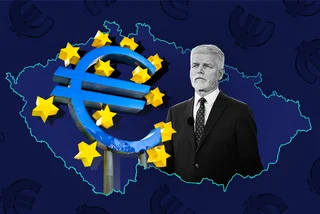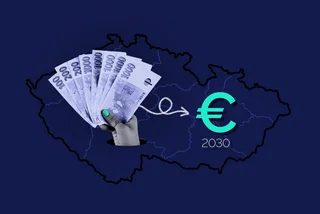Prime Minister Petr Fiala stated Wednesday afternoon that Czechia’s adoption of the euro is definitively off the table at least until the country’s next general election, which will come around October 2025. Fiala says that the country does not yet even meet the criteria for adopting the single currency, and that Czechia must first get its public finances in shape.
Country's macroeconomy not good enough
"The government's main priority is to heal and consolidate public finances, which is a prerequisite for any debate on the euro to take place," Fiala said Wednesday after a cabinet meeting. "We must continue to prioritize this task,” he added. He pointed out that the country must first fix its wide deficit and ensure better price stability.
In order to qualify for eurozone membership, a country must meet certain requirements (known as the Maastricht criteria), including maintaining a budget deficit of no more than 3 percent of its GDP.
The Czech Republic is expected to fall below this threshold for the first time since the start of the Covid-19 pandemic this year, but it has also struggled to meet other requirements such as inflation rates and participation in the European exchange-rate mechanism.
Prime Minister Petr Fiala"We are not opposed to the debate on the euro, but it must be based on solid foundations and consider the potential benefits for our country,"
Fiala acknowledged that there has been a growing debate about the euro, particularly in light of the upcoming elections to the European Parliament. However, he stressed that any discussion must be based on what is in the best interest of Czech citizens.
FOUR ELEMENTS OF THE MAASTRICHT CRITERIA
- Price stability: The country's inflation rate must not exceed by more than 1.5 percentage points the average inflation rate of the three eurozone countries with the lowest price growth.
- Long-term interest rate: The long-term interest rate is no more than 2 percentage points above the average of the three eurozone countries with the lowest inflation.
- Public finance: The budget deficit can’t exceed 3 percent of GDP and the debt ratio can’t be higher than 60 percent of GDP.
- Exchange-rate stability: The country must spend two years in the revised European Exchange Rate Mechanism (ERM II).
The prime minister also noted that the government is taking steps to assist businesses that may be at a disadvantage by not being part of the eurozone. This includes allowing companies to keep accounts, pay wages, and taxes in a foreign currency, which is likely to be the euro in most cases.
Do you think Czechia should adopt the euro?
Divided opinion on euro adoption
President Petr Pavel, on the other hand, has been a vocal supporter of adopting the euro. In his New Year's speech, he stated that a common currency is the logical future and urged the Czech Republic to take the necessary steps towards joining the eurozone.
In July 2023, Minister of Labor Marian Jurečka backed euro adoption and told the media that Czechia would fulfill the Maastricht criteria "by the end of the decade."
An analysis in 2021 by the ČNB pointed out the pros and cons of euro adoption for the Czech Republic. It said a big benefit would come from the country’s strong trade links with other EU countries. Risks include the economic differences between the Czech Republic and the EU as a whole such as the unusually high proportion of industry in Czech national GDP.
Czechs are generally against joining the eurozone. An opinion poll released last spring shows that just 18 percent of respondents are in favor of the country using the euro.
Czechia’s commitment to adopting the euro was made in the Treaty of Accession to the European Union in 2004, but the process has been delayed for various reasons. A country does not legally need to set a timeline or meet a deadline for adopting the single currency. Sweden is a prime example – despite joining the EU in 2005, it still uses the krona.













 Reading time: 3 minutes
Reading time: 3 minutes 
























